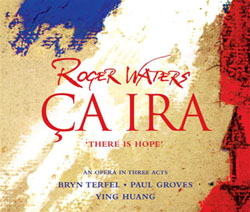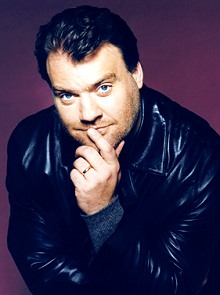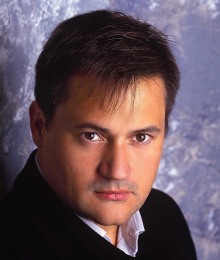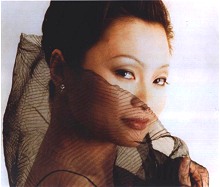|
 |
| Roger Waters - "Ça Ira" |
Possibly one of the biggest, and
most time-consuming, commercial gambles in Roger Waters' career, is "Ça
Ira", his opera based on the French Revolution. The 1989 French
Bicentennial inspired Roger to devote much effort to the piece, with
its central theme being the rich and dramatic events of the revolution.
The well-respected songwriter
Etienne Roda-Gil and his wife, Nadine, had created an original libretto
(set of lyrics, in effect) for an opera, written in French, as part of
the Bicentennial. Entitled "Ça Ira," after a revolutionary song of the
period, the Roda-Gil's original manuscript, copiously and beautifully
illustrated by Nadine, portrayed the events and the spirit of the
French Revolution through a multitude of perspectives - ranging from
Marie Antoinette to the eyes and ears of the period's revolutionaries
and common people - using a circus as a central theatrical framing
device and metaphor.
Waters was introduced by a mutual
friend, and, deeply impressed by the manuscript, began work on creating
the full orchestral score, and, in 1997, an English translation of the
work. Both Roda-Gil's have sadly since passed away. Work finished on
"Ça Ira" in January this year (2005), and September sees the work being
released as a two-SACD set, with accompanying book and DVD. This review
is of the CD version of the work, which is rich and atmospheric. The
SACD should be more so, the medium lending itself well to the source
material.
 |
| Bryn Terfel |
"Ça
Ira" features orchestration and choral arrangements by Rick Wentworth
and Roger Waters, also the album's producers. Principal characters in
the opera are brought to life by the Welsh bass-baritone Bryn Terfel
(the Ringmaster, the Troublemaker, Louis Capet - the King of France);
internationally acclaimed soprano Ying Huang (Marie Marianne - the
Voice of Liberty, Reason and the Republic, Marie Antoinette - the Queen
of France); American tenor Paul Groves (A Revolutionary Priest, A
Military Officer); and Senegalese "one man orchestra" Ismael Lo (a
Revolutionary Slave). Other parts are sung by Jamie Bower (Honest Bird
- the young Revolutionary Priest) and Helen Russill (Madame Antoine -
the young Marie Antoinette).
First off, let's be honest -
there will be a reasonable chunk of Roger's fans who won't step foot
anywhere near "Ça Ira", purely due to the nature of the work; opera
being "not for them". Admittedly, for those fans that live for guitar
solos, to the exclusion of all else, there will be little of interest.
However, those who avoid this
work, will be avoiding an incredible piece of work that reflects the
time and effort that Roger has been putting into it over the years.
One thing that those waverers
should bear in mind is that much of Roger's body of work has involved
well-structured, orchestral sequences, based on subtleties rather than
bombast, with a central story or concept at the heart of the work. "Ça
Ira" fits into this niche rather nicely, featuring a strong storyline
and understated, but perfectly paced, orchestration, conducted by Rick
Wentworth.
It is a piece of music that
repays repeat listenings; the first hearings reveal interesting melody
lines and vocal hooks, but as your familiarity with the piece grows, so
does your appreciation. I quickly found myself totally absorbed into
"Ça Ira", picking up new subtleties as I got to grips with the story.
Once you start to follow this, the piece really takes on a different
air, and goes up a level.
The baying of hounds, the cry of
birds, and the sound of a marching band make their way through the mist
to play a military tattoo, soon disappearing into the ether. The
Overture starts - a beautiful, mournful, and at times dramatic piece -
a portent of things to come?
One soon gets the impression of a
theatrical event taking place, confirmed with the appearance of The
Ring Master (one of Bryn Terfel's roles) introducing the story (a very
typically Shakespearean device). The idea is that the story of "Ça Ira"
is presented in the form of a circus.
 |
| Paul Groves |
Cut
to a Viennese garden in 1765, and the start of the story of Marie
Antoine, at that stage a ten year old girl who was later to become
Marie Antoinette, playing in the garden and dreaming of what it was
going to be like once she was queen. A local lad berates her attitude
in the whimsical, pretty little track, just to be told to pipe down!
The Ring Master uses the analogy
of a bird singing, equating to the free spirit, unafraid to speak the
truth about how life should be. This analogy of an "Honest Bird, Simple
Bird" is developed further, showing how the seeds of revolution were
growing, and introduces the other two main vocalists on the piece -
Ying Huang (as the voice of Liberty, Reason and The Republic) and Paul
Groves (as a Military Officer).
"Let Us Break All The Shields"
has the three of them (Groves, Huang and Terfel) singing to a powerful
crescendo clearly demonstrating why they are amongst those at the very
top of their profession.
Very powerful orchestration,
understated and melancholy, allied to Groves' and Terfel's vocal,
expresses the growing discontent and worsening situation of the
ordinary French people.
Things descent further with the
slaughter of protesters ("France in Disarray") where orchestration is
kept at a minimum to highlight the singer's emotional delivery. With
the storming of the Bastille, the hope of the dispossessed grows and
"So To The Streets In The Pouring Rain" raises the tone of the piece to
determined optimism.
The story is swung around, with
the King Of France's realisation of the situation, and hope for his
offspring to be seen in a better light than him. Sadness turns to
irritation and defiance, leading to a grand ball that features the
waltz heard in passing, in "The Overture".
The ticking of a clock, and the
striking of a match for a candle, starts off "The Letter", with Louis
XVI writing to his cousin Charles, while the rain falls on his cell
window, dreaming about Charles in his Spanish castle.
A beautiful song - with the
melody line from Every Stranger's Eyes - "My Dear Cousin Bourbon of
Spain" has Louis setting out his desolate feelings on events on the
page.
"The Ship Of State Is All At Sea"
reveals how supplies of everything - even the all-important coffee -
have dried up. "Silver, Sugar and Indigo/To The Windward Isles"
develops this further, switching the action to a ship bound for the
farflung island, to pick up more supplies - but with Ismael Lo's
plaintive cry for freedom from slavery. The song becomes, in musical
terms, a huge production number, with the added voices of Terfel and
Huang.
With the Roman Catholic church
also supporting the monarchy, feelings continue to grow in the streets,
and the menacing orchestration reinforces this.
An attempt to flee to Prussia
fails, as does a declaration of war on Austria when the Duke of
Brunswick threatens Paris with destruction, all of which enrages the
revolutionaries even more. The military tattoo of the music shows them
marching through the streets, demanding justice - even in the face of a
firing squad, cutting them down as they sing, defiantly.
 |
| Ying Huang |
The
sadness pours out of Terfel's vocal on "The Echoes Never Fade From That
Fusillade", lamenting those "who's only crime has been to dream of
freedom". However, with the sound of a bird taking flight, the note
turns more optimistic and determined.
The whole point of Roger's opera
is summarised neatly in a line from "Vive la Commune de Paris", when
Terfel sings: "Everyone under the sun has the power to change the way
the world is arranged" - the power of the individual to make a
difference, to stand up and be counted.
The National Assembly sentences
King Louis XVI to death, after abolishing the monarchy. An effectively
paced execution scene; it might be just me, but the demise of the King
at the end of "The Execution Of Louis Capet/Adieu Louis For You It's
Over" has an unintentionally amusing note to it. Certainly, there's an
element of pleasure, relish or delight in his captors voices as they
bring him to his conclusion.
It's now Marie Antoinette's turn,
and amidst some wonderful choral work, her end is explored, she laments
her life - particularly poigniently, her children. This song was
inspired by a letter she sent to her sister - which impressed Roger
greatly.
With Antoinette dead ("Adieu, My
Good And Tender Sister"), the republicans consider the evil of the
guillotine - how they've all suffered, the rivers of blood, and how
"the great and the small are equal after all..." They look to the
future with optimism, having "the strength and the bravery to feel what
we feel, and be what we'd be".
The final crescendo cry of "Ça
Ira" concludes a piece of work that totally exceeded my expectations.
Rich and atmospheric, with subtle, yet powerful orchestration, and
superb vocal performances throughout. Bryn Terfel's vocal, in
particular, is wonderful - clear, crisp and perfect diction throughout.
With a piece like this, it is vital to be able to understand the
vocals, and Terfel's delivery is exactly right.
The performances deliver emotion
and resolve, and there are a few echoes of Roger's previous work hidden
here and there, to ensure even the most cynical fan gets something from
it. Thankfully, Roger has kept these to the minimum, and the additional
sound effects (for atmosphere and story progression) are not overused,
striking the right balance. Those who might be concerned that
(particularly for the surround sound SACD release) the sounds of
cannons, gunfire and guillotines might be the main focus, can rest easy.
It will be interesting to see how
well "Ça Ira" does commercially and critically; it deserves to do well,
in my opinion. There will, of course, be two main camps interested in
it, and how it is received in each will be fascinating.
Give "Ça Ira" some of your time, getting to know it, and it will repay you handsomely.
The special edition SACD and DVD digipack can be ordered through these special links: Amazon.co.uk (UK/elsewhere), Amazon.com (US/International), Canada, France, or Germany. They also have the normal edition, without the DVD.
|
 Reviews
Reviews  Albums
Albums  Roger Waters - �a Ira
Roger Waters - �a Ira
















